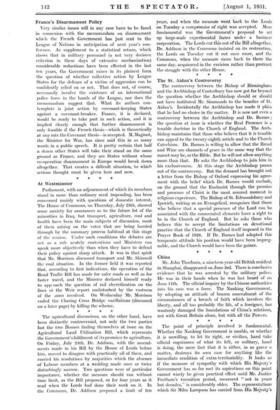France's Disarmament Policy Very similar issues will in any case
have to be faced in connexion with the memorandum on disarmament which the French Government has just sent to the League of Nations in anticipation of next year's con- ference. As supplement to a statistical return, which shows that in military personnel (a not very decisive criterion in these days of extensive mechanization) considerable reductions have been effected in the last ten years, the Government raises in its plainest form the question of whether collective action by League States for the defence of a victim of aggression can be confidently relied on or not. That does not, of course, necessarily involve the existence of an international police force in the hands of the League, nor does the memorandum suggest that. What its authors con- template is joint action by covenant-keeping States against a covenant-breaker. France, it is declared, would be ready to take part in such action, and it is implied clearly enough that further disarmament is only feasible if the French thesis—which is theoretically at any rate the Covenant thesis—is accepted. M. Maginot, the Minister for War, has since said this in as many words in a public speech. It is pretty certain that half a dozen other States will take their stand on the same ground as France, and they - are States without whose co-operation disarmament in Europe would break down altogether. That creates a difficult situation, to which serious thought must be given here and now.


































 Previous page
Previous page